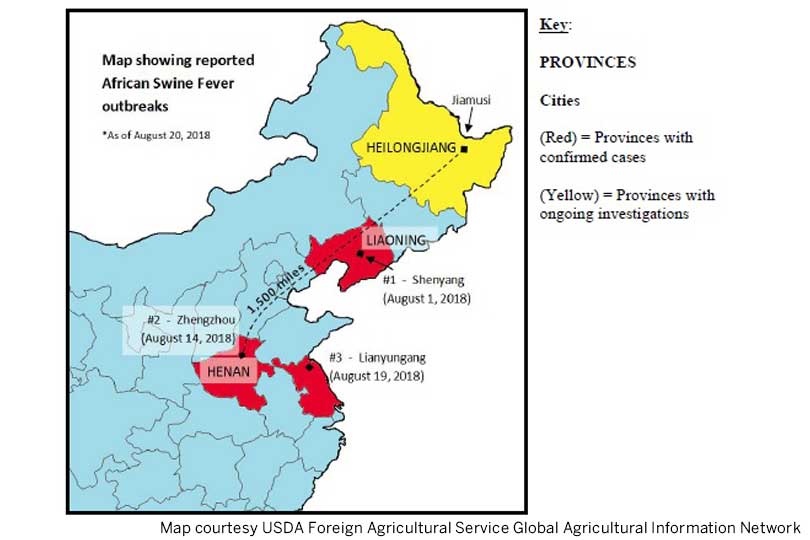By Jessica Domel
Multimedia Reporter
Officials in the People’s Republic of China are working to stop the spread of the highly contagious African Swine Fever (ASF) in the heart of the country’s pig-producing regions.
The World Organisation for Animal Health (OIE) confirmed four ASF outbreaks in China Aug. 1-17.
According to Reuters, the Aug. 1 case was the first occurrence of ASF in East Asia.
Three of the outbreaks occurred on farms, while a fourth was confirmed in a now-quarantined slaughterhouse. That outbreak was later linked to a farm 1,500 miles away.
Chinese officials reported 1,122 cases of ASF. An additional 9,592 pigs were destroyed in an effort to contain the disease.
“Since China is the largest swine producer and pork consumer in the world, a major ASF outbreak can have a significant impact on China’s food security and trade,” a report from the U.S. Department of Agriculture (USDA) Foreign Agricultural Service (FAS) Global Agricultural Information Network (GAIN) said.
Two of the outbreaks occurred in areas that produce 14 percent of China’s total swine population.
They border provinces that account for another 19 percent of production, according to the GAIN report.
China’s Ministry of Agriculture and Rural Affairs has reportedly banned farmers from feeding swine untreated food waste and transporting pigs and hogs from outbreak areas.
As of Aug. 24, ASF cases were reported in: Ukraine, Hungary, Moldova, Romania, Poland, Latvia and Russia.
ASF is a hemorrhagic disease that affects pigs, warthogs, European wild board and American wild pigs, according to OIE. All age groups are equally susceptible.
ASF is spread through direct contact with infected pigs or pig meat. Biting flies and ticks, contaminated vehicles, premises, equipment and clothing may also spread the virus.
There is no vaccine or treatment available.
In animals with severe cases, symptoms include high fever, loss of appetite, hemorrhaging in the skin and internal organs. Death occurs within two to 10 days on average.
The mortality rate may be as high as 100 percent, OIE reports.
According to OIE, there is no human health threat with ASF.

